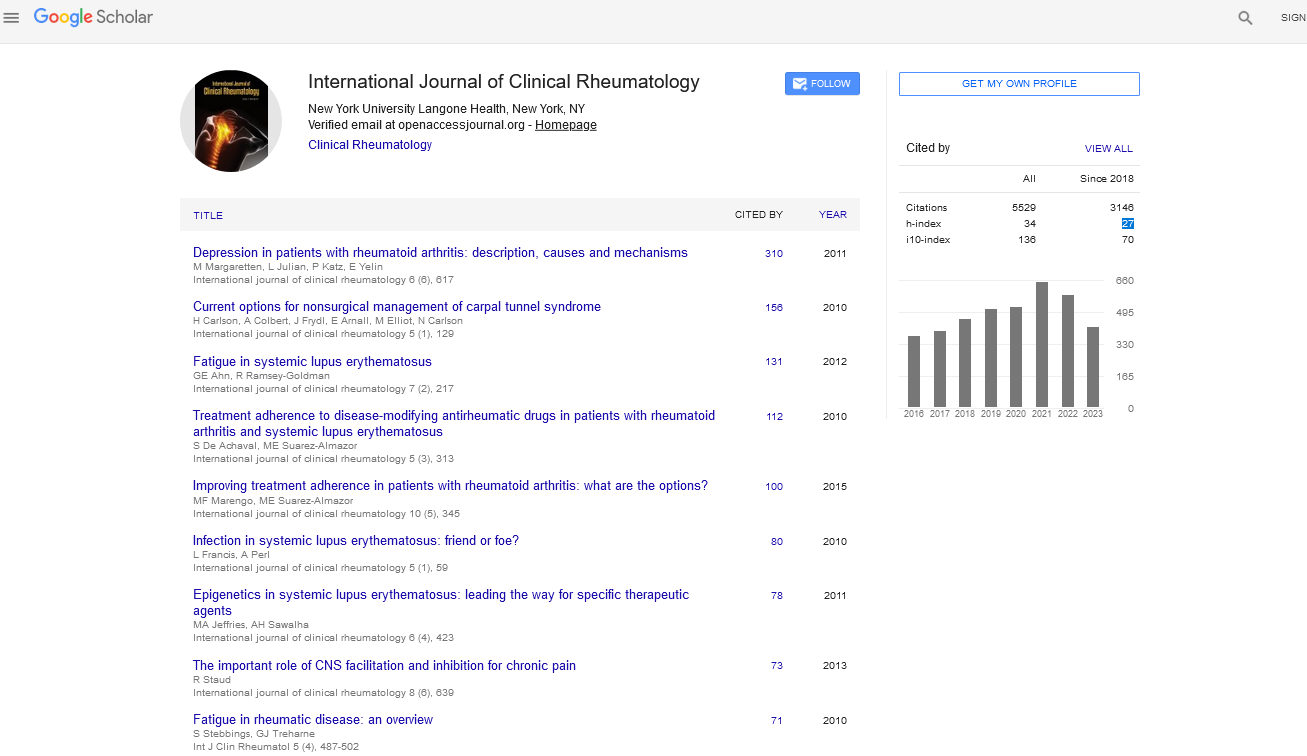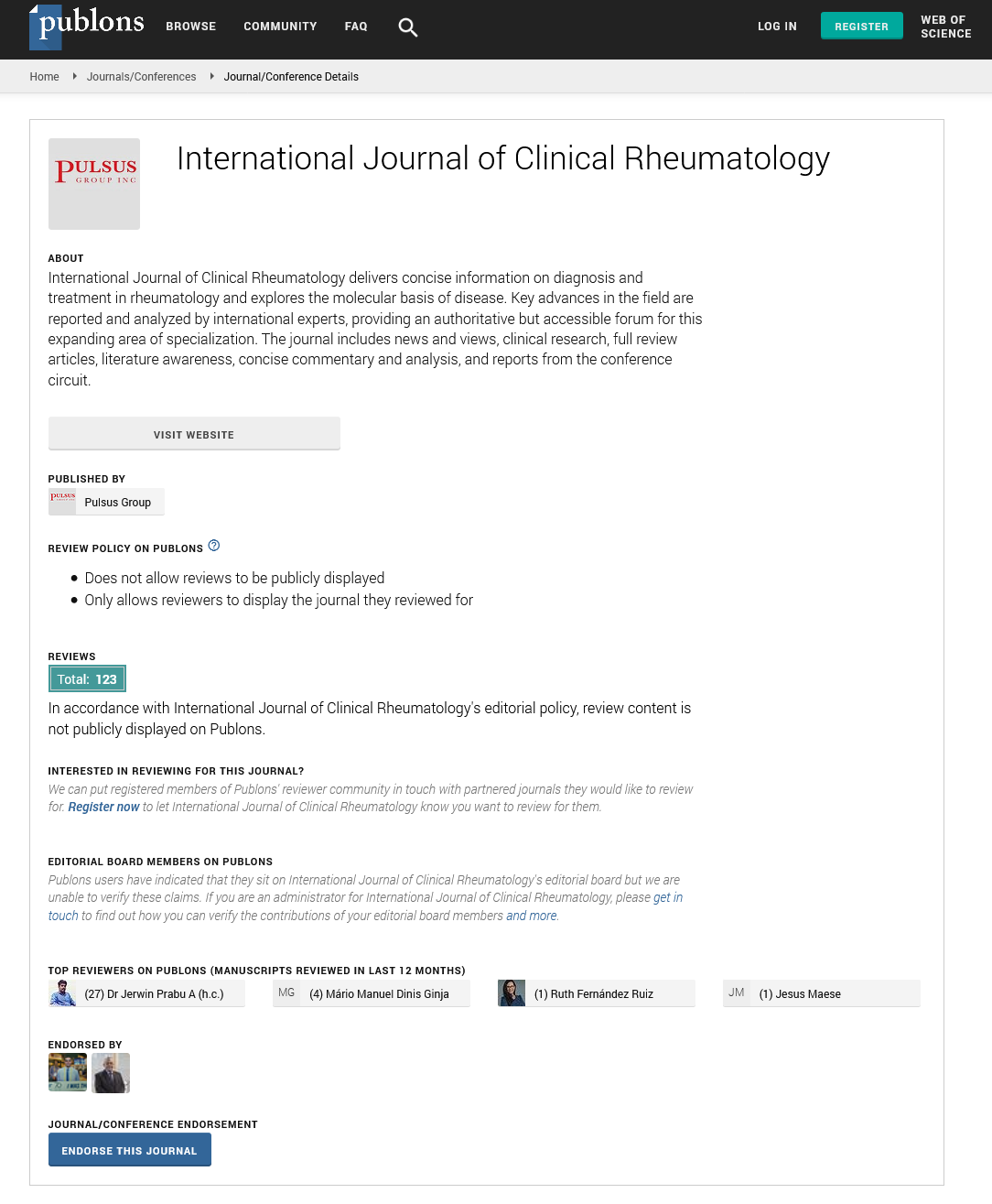Review Article - International Journal of Clinical Rheumatology (2023) Volume 18, Issue 5
Immunology: Understanding the Complexities of the Immune System
Dr. Joel Wilshon*
Department of Clinical Research, University of Southern Denmark, Odense University Hospital, Odense, Denmark
Department of Clinical Research, University of Southern Denmark, Odense University Hospital, Odense, Denmark
E-mail: Wilshon@Joel.com
Received: 03-May-2023, Manuscript No. fmijcr-23-101169; Editor assigned: 05- May-2023, Pre-QC No. fmijcr-23-101169 (PQ); Reviewed: 19-May-2023, QC No. fmijcr-23-101169; Revised: 24-May- 2023, Manuscript No. fmijcr-23-101169 (R); Published: 31-May-2023, DOI: 10.37532/1758-4272.2023.18 (5).99-101
Abstract
Immunology is a branch of biomedical science that encompasses the study of the immune system and its role in defending the body against pathogens, as well as its involvement in various diseases. This field explores the complex interactions between the immune system and foreign substances, such as bacteria, viruses, and allergens, and seeks to understand the mechanisms underlying immune responses. Immunological research has yielded insights into the development of vaccines, immunotherapies, and diagnostic tools for a wide range of conditions, including infectious diseases, autoimmune disorders, and cancer. This abstract provides an overview of the field of immunology, highlighting its key areas of study and the significant contributions it has made to healthcare. This abstract provides an overview of key concepts in immunology, including the components of the immune system, the mechanisms of immune response, and the factors that influence immune function. It also highlights the importance of immunology in understanding and treating diseases, such as infectious diseases, autoimmune disorders, and cancer. The immune system comprises innate and adaptive components, each with its unique mechanisms and functions. Innate immunity provides immediate, nonspecific defense mechanisms that act as the first line of defense against pathogens. This includes physical barriers, such as the skin and mucous membranes, as well as cellular components like phagocytes and natural killer cells. Adaptive immunity, on the other hand, is a highly specialized response that develops over time and provides long-lasting protection. It involves the activation of lymphocytes, including B cells and T cells, which can recognize specific pathogens or antigens.
Keywords
Immunology • Immune system • pathogens • Immune responses • Vaccines • Immunotherapy • Infectious diseases • Autoimmune disorders • Cancer • Biomedical science
Introduction
The immune system is a remarkable and intricate network within our bodies that defends us against a wide range of pathogens, including bacteria, viruses, fungi, and parasites. It acts as our body's defense mechanism, keeping us healthy and protecting us from various diseases. The study of the immune system and its functions is known as immunology. Immunology encompasses the understanding of how our bodies recognize and respond to foreign invaders, as well as the intricate mechanisms that regulate immune responses. Immunology is a branch of biology that focuses on the study of the immune system, which plays a vital role in protecting organisms from harmful pathogens, such as bacteria, viruses, fungi, and parasites[1]. The immune system is a complex network of cells, tissues, and molecules that work together to recognize and eliminate foreign invaders while maintaining tolerance to self-components. The immune system is a remarkable defense mechanism that provides both innate and adaptive immunity. Innate immunity is the first line of defense and includes physical barriers like the skin and mucous membranes, as well as cells such as neutrophils, macrophages, and natural killer cells. These components provide immediate protection and act as the body's initial response to infection.
Adaptive immunity, on the other hand, is a highly specific and sophisticated defense mechanism. It involves the recognition of specific antigens, which are unique molecules on the surface of pathogens, by immune cells known as lymphocytes. There are two main types of lymphocytes involved in adaptive immunity: B cells and T cells [2]. B cells produce antibodies that can neutralize or eliminate pathogens directly, while T cells have various functions, including helping B cells, killing infected cells, and regulating the immune response. Immunology also encompasses the study of immune disorders, such as autoimmune diseases, allergies, and immunodeficiency’s. Autoimmune diseases occur when the immune system mistakenly attacks the body's own cells and tissues, leading to chronic inflammation and tissue damage. Allergies, on the other hand, result from an exaggerated immune response to harmless substances in the environment. Immunodeficiencies, whether congenital or acquired, involve a weakened or absent immune response, making individuals more susceptible to infections [3].
Material and Methods
Advancements in immunology have led to significant breakthroughs in medicine, particularly in the fields of vaccination, organ transplantation, and cancer immunotherapy. Vaccines harness the immune system's ability to recognize and remember pathogens, providing long-term protection against infectious diseases. Organ transplantation relies on immunosuppressive drugs to prevent the immune system from rejecting the transplanted organ. Cancer immunotherapy utilizes various strategies to stimulate or enhance the immune response against cancer cells, offering promising new treatment options [4].
Components of the immune system
The immune system is composed of numerous cells, tissues, and molecules that work together to mount an effective defense against pathogens. The key components of the immune system include:
White blood cells: White blood cells, or leukocytes, are the primary cellular components of the immune system. There are two main types of white blood cells: phagocytes and lymphocytes. Phagocytes, such as neutrophils and macrophages, engulf and destroy invading microorganisms. Lymphocytes, on the other hand, are responsible for the more specialized functions of the immune system, including recognizing specific pathogens and orchestrating immune responses [5].
Lymphoid organs: Lymphoid organs are specialized tissues that house and support the development and activation of immune cells. These organs include the bone marrow, thymus, lymph nodes, spleen, and tonsils. They play a crucial role in filtering and trapping foreign particles, facilitating the maturation of immune cells, and coordinating immune responses.
Antibodies: Antibodies, also known as immunoglobulins, are proteins produced by B lymphocytes (B cells) in response to foreign substances. These molecules recognize and bind to specific antigens, which are unique molecular markers found on the surface of pathogens. Antibodies can neutralize pathogens directly, mark them for destruction by ot
Cytokines: Cytokines are small proteins secreted by immune cells that regulate various aspects of immune responses. They act as messengers, facilitating communication between different immune cells and coordinating their activities. Cytokines can stimulate inflammation, enhance immune cell proliferation, and modulate the intensity and duration of immune responses [6].
The immune response
When a pathogen enters the body, it triggers a series of immune responses aimed at eliminating the invader and preventing its spread. The immune response can be divided into two main types: innate immunity and adaptive immunity.
Innate immunity: Innate immunity is the first line of defense against pathogens. It is a rapid, non-specific response that is present from birth. Innate immune cells, such as neutrophils, macrophages, and natural killer (NK) cells, recognize common features shared by a wide range of pathogens. They respond quickly to infections by engulfing and destroying the pathogens, releasing antimicrobial proteins, and activating other immune cells.
Adaptive immunity: Adaptive immunity is a more specialized and tailored response that develops over time. It relies on the recognition of specific antigens by lymphocytes, particularly T cells and B cells. T cells, which mature in the thymus, recognize antigens displayed on the surface of infected cells, whereas B cells produce antibodies that bind to antigens in body fluids. The adaptive immune response has memory, allowing the immune system to respond more rapidly and effectively to recurring infections [7].
Immunological disorders and applications
The immune system, while vital for maintaining health, can also malfunction, leading to various immunological disorders. Autoimmune diseases, such as rheumatoid arthritis, lupus, and multiple sclerosis, occur when the immune system mistakenly targets and attacks the body's own cells and tissues.
Conclusion
Immunology plays a fundamental role in deciphering the complexities of the immune system and its function. The field's advancements have broad implications for human health, enabling the development of effective interventions against infectious diseases, cancer, and autoimmune disorders [8]. As our understanding of immunology continues to expand, it promises to revolutionize healthcare by providing innovative approaches to disease prevention, diagnosis, and treatment. Immunology plays a fundamental role in understanding how the immune system functions, protects against diseases, and can be manipulated for therapeutic purposes. It continues to be an exciting and rapidly evolving field of research, providing insights into both basic biology and clinical applications that have the potential to improve human health and well-being.
Immunology is a fascinating field of study that explores the complex and intricate mechanisms by which our immune system protects us from infections and diseases. Through extensive research and advancements in technology, our understanding of immunology has greatly expanded, leading to breakthroughs in the prevention, diagnosis, and treatment of various immune-related disorders. Immunology plays a crucial role in our overall health and well-being, as it not only defends us against harmful pathogens but also regulates immune responses to prevent excessive inflammation and tissue damage [9]. It encompasses a wide range of topics, including the development and function of immune cells, the recognition and elimination of foreign substances, and the coordination of immune responses. Recent advancements in immunology research have opened up new avenues for innovative therapies. The field of immunotherapy, for instance, has revolutionized cancer treatment by harnessing the power of the immune system to specifically target and destroy cancer cells. Similarly, vaccines have been instrumental in preventing numerous infectious diseases, saving countless lives worldwide.
Immunology is a dynamic and ever-evolving field that holds immense potential for improving human health. With ongoing research and collaboration, we can expect to unravel further mysteries of the immune system and develop novel strategies to combat diseases and enhance our immune defences [10].
Conflict of Interest
None
Acknowledgment
None
References
- Tomlin JL, Sturgeon C, Pead MJ et al. Use of the bisphosphonate drug alendronate for palliative management of osteosarcoma in two dogs. Vet Rec. 147(5), 129-132 (2000).
- Loukopoulos P, Thornton JR, Robinson WF et al. Clinical and pathologic relevance of p53 index in canine osseous tumors. Vet Pathol. 40(3), 237-248 (2003).
- Wilkins RM, Cullen JW, Odom L et al. Superior survival in treatment of primary nonmetastatic pediatric osteosarcoma of the extremity. Ann Surg Oncol. 10(5), 498-507 (2003).
- Papalas JA, Balmer NN, Wallace C et al. Ossifying dermatofibroma with osteoclast-like giant cells: report of a case and literature review. Am J Dermatopathol. 31(4), 379-383 (2009).
- Luetke A, Meyers PA, Lewis A, et al. Osteosarcoma treatment where do we stand a state of the art review. Cancer Treat Rev. 40(4), 523-532 (2014).
- Fletcher CDM, Bridge JA, Hogendoorn P et al. WHO Classification of Tumours of Soft Tissue and Bone. IARC, Lyon. 4 (2013).
- Flint A, Weiss SW. CD-34 and keratin expression distinguishes solitary fibrous tumor (fibrous mesothelioma) of the pleura from desmoplastic mesothelioma. Hum Pathol. 26(4), 428-431 (1995).
- Doyle LA. Sarcoma classification: an update based on the 2013 World Health Organization classification of tumors of soft tissue and bone. Cancer. 120(12), 1763-1774 (2016).
- England DM, Hochholzer L, McCarthy MJ et al. Localized benign and malignant fibrous tumors of the pleura. A clinicopathologic review of 223 cases. Am J Surg Pathol. 13(8), 640-658 (1989).
- Within GB, Rosai J. Solitary fibrous tumor of the mediastinum: a report of 14 cases. Am J Surg Pathol. 13(7), 547-557 (1989).
Indexed at, Google Scholar, Crossref
Indexed at, Google Scholar, Crossref
Indexed at, Google Scholar, Crossref
Indexed at, Google Scholar, Crossref
Indexed at, Google Scholar, Crossref
Indexed at, Google Scholar, Crossref
Indexed at, Google Scholar, Crossref
Indexed at, Google Scholar, Crossref
Indexed at, Google Scholar, Crossref


